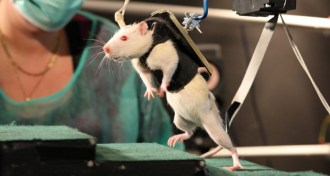Search Results for: Bears
Skip to resultsCan’t find what you’re looking for? Visit our FAQ page.
6,904 results for: Bears
-
 Physics
PhysicsPlants’ reproductive weaponry unfurled
Botanical tricks include adhesion and bubbles to spread their spores into the environment.
-
 Life
LifeFossil pushes back land-animal debut
Creatures first squished mud through their five toes millions of years earlier than previously believed.
By Devin Powell -
 Life
LifeCarnivores can lose sweet genes
A gene involved in taste detection has glitches in some, but not all, highly carnivorous mammals.
By Susan Milius -
 Humans
HumansTeens win big at science competition
The top awards in the 2012 Intel Science Talent Search go to young scientists working on cancer, innovative sources of energy and behavioral genetics.
By Devin Powell -
 Life
LifeGeneticists go ape for better primate family tree
The first gorilla genome and a more detailed look at chimp genetics provide new clues to evolution of humans and their closest relatives.
-
 Space
SpaceVesta seems more planet than asteroid
Spacecraft explorations reveal a layered, beat-up celestial body.
By Nadia Drake -
 Life
LifeStem cell treatment spurs cartilage growth
A small molecule called kartogenin prompts the manufacture of lost connective tissue in mice.
By Nathan Seppa -
 Life
LifePolar bears older than previously thought
New analysis reveals that the Arctic species dates back to about 600,000 years ago.
-
 Health & Medicine
Health & MedicineTest drug eases behavioral symptoms seen in autism
In mouse experiments, the compound curbs repetitive behaviors and improves sociability.
-
 Humans
HumansMaya wall calendar discovered
Classic-era structure displays rare calculations of lunar and planetary cycles.
By Bruce Bower -
 Life
LifeTreatment helps paralyzed rats walk
A combination of drugs, electrical stimulation and therapy can restore lost connections between lower limbs and brain.
-
 Archaeology
ArchaeologyOldest pottery comes from Chinese cave
New dates show that East Asian hunter-gatherers fired up cooking vessels 20,000 years ago.
By Bruce Bower